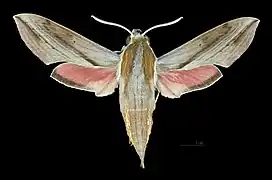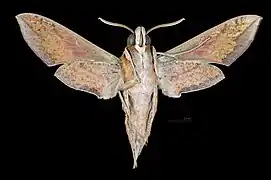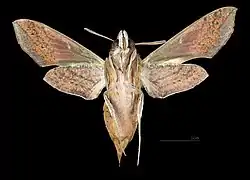Hippotion rosetta
Hippotion rosetta, or Swinhoe's striated hawkmoth, is a sphingid moth of the family Sphingidae. The species was first described by Charles Swinhoe in 1892.[1]
| Hippotion rosetta | |
|---|---|
.jpg.webp) | |
| Scientific classification | |
| Kingdom: | Animalia |
| Phylum: | Arthropoda |
| Class: | Insecta |
| Order: | Lepidoptera |
| Family: | Sphingidae |
| Genus: | Hippotion |
| Species: | H. rosetta |
| Binomial name | |
| Hippotion rosetta (C. Swinhoe, 1892) | |
| Synonyms | |
| |
Distribution
It is found from southern Pakistan, India, the Maldives and Sri Lanka, east across Thailand, southern China and Taiwan to southern Japan (the Ryukyu Archipelago) and the Philippines, then south across south-east Asia to the Andaman Islands, eastern Indonesia, the Solomon Islands and the Torres Strait of New Guinea.
Description
 Male dorsal view
Male dorsal view Male ventral view
Male ventral view Female dorsal view
Female dorsal view Female ventral view
Female ventral view
Biology
There are several generations per year in Hong Kong, with adults on wing from March to November, with peaks in late March, May and early October.
Larvae have been recorded on Borreria, Morinda citrifolia and Morinda umbellata, as well as Pentas lanceolata.
References
- "CATE Creating a Taxonomic eScience - Sphingidae". Cate-sphingidae.org. Archived from the original on October 20, 2012. Retrieved October 25, 2011.
- Pinhey, E. (1962). Hawk Moths of Central and Southern Africa. Longmans Southern Africa, Cape Town.
External links
- Pittaway, A. R.; Kitching, I. J. "Hippotion rosetta (Swinhoe, 1892) -- Swinhoe's striated hawkmoth". Sphingidae of the Eastern Palaearctic. Retrieved December 15, 2018.
This article is issued from Wikipedia. The text is licensed under Creative Commons - Attribution - Sharealike. Additional terms may apply for the media files.